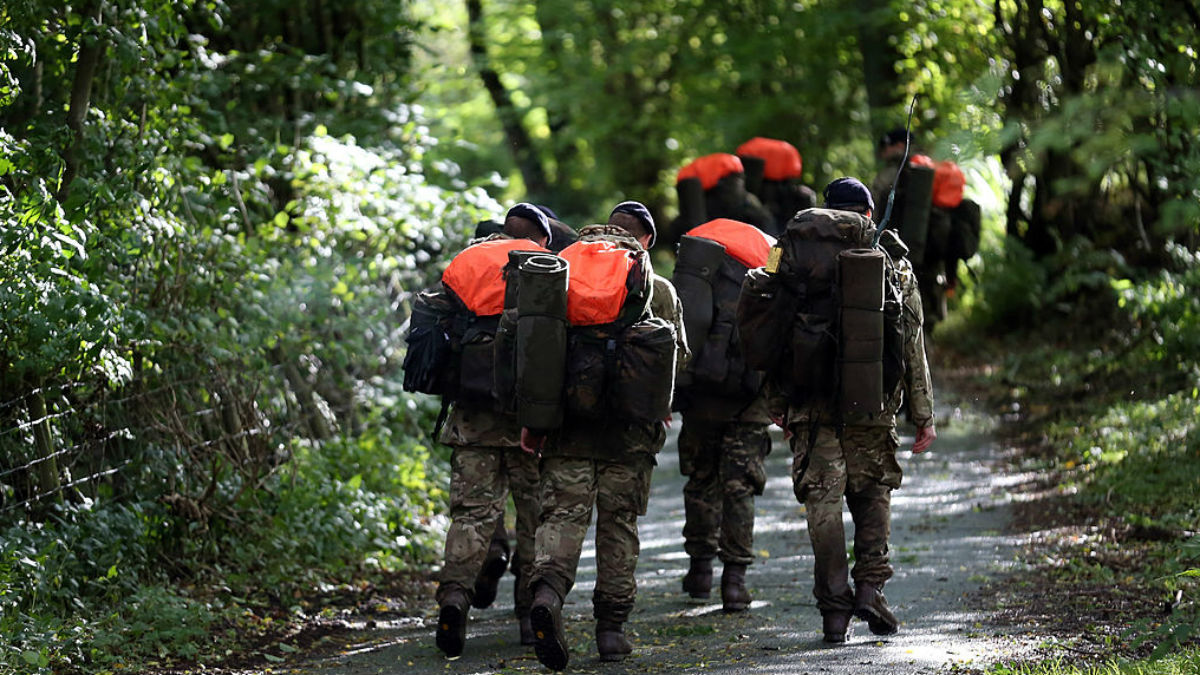Soldier dies in Brecon Beacons on hottest day of year
Corporal Joshua Hoole collapsed during a training exercise in the Welsh national park

A free daily email with the biggest news stories of the day – and the best features from TheWeek.com
You are now subscribed
Your newsletter sign-up was successful
A rifleman from Scotland has died while training in the Brecon Beacons.
"We can confirm that a soldier from Infantry training centre Catterick died on 19 July while conducting pre-course training for the platoon sergeants' battle course (PSBC) in Brecon," the Ministry of Defence (MoD) said.
Emergency services were summoned to Dering Lines infantry training centre shortly before 9am on Tuesday in response to a medical emergency, the BBC reports.
The Week
Escape your echo chamber. Get the facts behind the news, plus analysis from multiple perspectives.

Sign up for The Week's Free Newsletters
From our morning news briefing to a weekly Good News Newsletter, get the best of The Week delivered directly to your inbox.
From our morning news briefing to a weekly Good News Newsletter, get the best of The Week delivered directly to your inbox.
The soldier was named as Joshua Hoole, a 26-year-old corporal from Lockerbie who belonged to the Rifles regiment. The South Wales Evening Post says he was taking part in an eight-mile run when he was taken ill.
The PSBC, which the MoD says is "mentally and physically demanding", is designed to prepare soldiers for the "rigours of command". Successful candidates are eligible for promotion to platoon sergeant in the Rifles regiment.
The MoD will undertake a "full investigation" into the incident, said junior defence minister Harriett Baldwin, who called the news "very sad".
The death comes three years after the MoD was officially censured by the Health and Safety Executive over the deaths of three army reservists who collapsed during a heatwave in the Brecon Beacons.
A free daily email with the biggest news stories of the day – and the best features from TheWeek.com
James Dunsby, Edward Maher and Craig Roberts were taking part in a gruelling march for potential SAS recruits when they suffered heat illness. An inquest found the march organisers had made "very serious mistakes", including insufficient access to water and a "chaotic" emergency response.
-
 The ‘ravenous’ demand for Cornish minerals
The ‘ravenous’ demand for Cornish mineralsUnder the Radar Growing need for critical minerals to power tech has intensified ‘appetite’ for lithium, which could be a ‘huge boon’ for local economy
-
 Why are election experts taking Trump’s midterm threats seriously?
Why are election experts taking Trump’s midterm threats seriously?IN THE SPOTLIGHT As the president muses about polling place deployments and a centralized electoral system aimed at one-party control, lawmakers are taking this administration at its word
-
 ‘Restaurateurs have become millionaires’
‘Restaurateurs have become millionaires’Instant Opinion Opinion, comment and editorials of the day
-
 Home Office worker accused of spiking mistress’s drink with abortion drug
Home Office worker accused of spiking mistress’s drink with abortion drugSpeed Read Darren Burke had failed to convince his girlfriend to terminate pregnancy
-
 In hock to Moscow: exploring Germany’s woeful energy policy
In hock to Moscow: exploring Germany’s woeful energy policySpeed Read Don’t expect Berlin to wean itself off Russian gas any time soon
-
 Were Covid restrictions dropped too soon?
Were Covid restrictions dropped too soon?Speed Read ‘Living with Covid’ is already proving problematic – just look at the travel chaos this week
-
 Inclusive Britain: a new strategy for tackling racism in the UK
Inclusive Britain: a new strategy for tackling racism in the UKSpeed Read Government has revealed action plan setting out 74 steps that ministers will take
-
 Sandy Hook families vs. Remington: a small victory over the gunmakers
Sandy Hook families vs. Remington: a small victory over the gunmakersSpeed Read Last week the families settled a lawsuit for $73m against the manufacturer
-
 Farmers vs. walkers: the battle over ‘Britain’s green and pleasant land’
Farmers vs. walkers: the battle over ‘Britain’s green and pleasant land’Speed Read Updated Countryside Code tells farmers: ‘be nice, say hello, share the space’
-
 Motherhood: why are we putting it off?
Motherhood: why are we putting it off?Speed Read Stats show around 50% of women in England and Wales now don’t have children by 30
-
 Anti-Semitism in America: a case of double standards?
Anti-Semitism in America: a case of double standards?Speed Read Officials were strikingly reluctant to link Texas synagogue attack to anti-Semitism